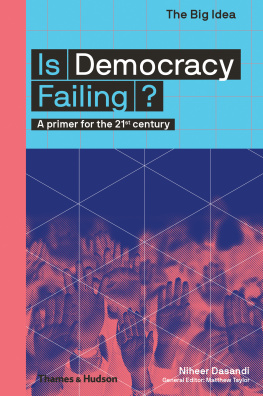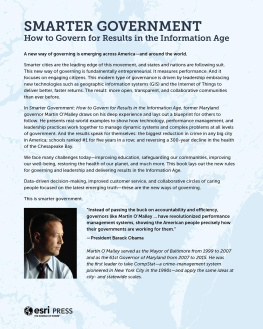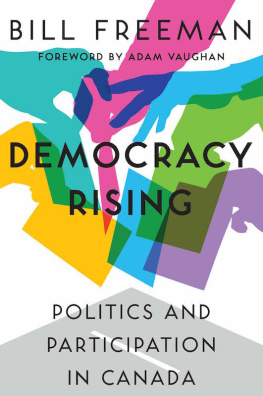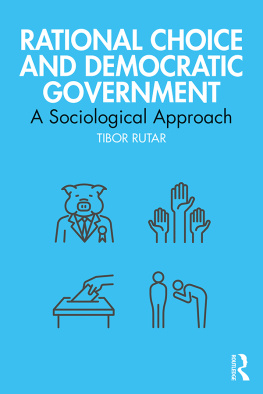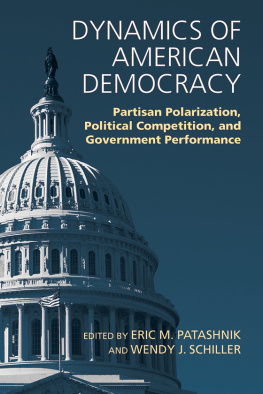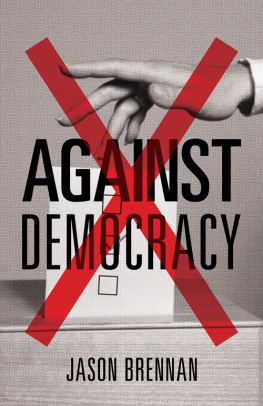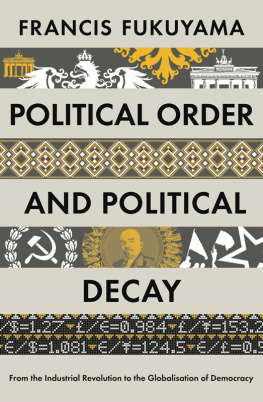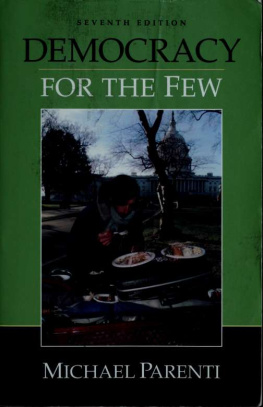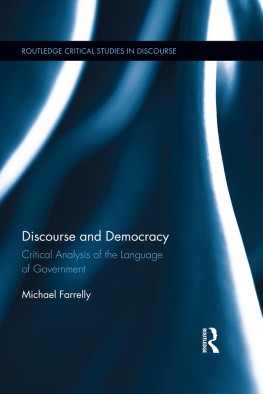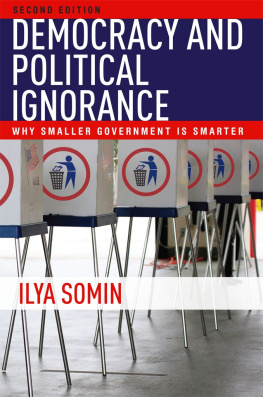Somin - Democracy and Political Ignorance: Why Smaller Government Is Smarter
Here you can read online Somin - Democracy and Political Ignorance: Why Smaller Government Is Smarter full text of the book (entire story) in english for free. Download pdf and epub, get meaning, cover and reviews about this ebook. year: 2013, publisher: Stanford University Press, genre: Politics. Description of the work, (preface) as well as reviews are available. Best literature library LitArk.com created for fans of good reading and offers a wide selection of genres:
Romance novel
Science fiction
Adventure
Detective
Science
History
Home and family
Prose
Art
Politics
Computer
Non-fiction
Religion
Business
Children
Humor
Choose a favorite category and find really read worthwhile books. Enjoy immersion in the world of imagination, feel the emotions of the characters or learn something new for yourself, make an fascinating discovery.

Democracy and Political Ignorance: Why Smaller Government Is Smarter: summary, description and annotation
We offer to read an annotation, description, summary or preface (depends on what the author of the book "Democracy and Political Ignorance: Why Smaller Government Is Smarter" wrote himself). If you haven't found the necessary information about the book — write in the comments, we will try to find it.
Somin: author's other books
Who wrote Democracy and Political Ignorance: Why Smaller Government Is Smarter? Find out the surname, the name of the author of the book and a list of all author's works by series.
Democracy and Political Ignorance: Why Smaller Government Is Smarter — read online for free the complete book (whole text) full work
Below is the text of the book, divided by pages. System saving the place of the last page read, allows you to conveniently read the book "Democracy and Political Ignorance: Why Smaller Government Is Smarter" online for free, without having to search again every time where you left off. Put a bookmark, and you can go to the page where you finished reading at any time.
Font size:
Interval:
Bookmark:
DEMOCRACY AND POLITICAL IGNORANCE
WHY SMALLER GOVERNMENT IS SMARTER
Ilya Somin
STANFORD LAW BOOKS
An Imprint of Stanford University Press
Stanford, California
Stanford University Press
Stanford, California
2013 by the Board of Trustees of the Leland Stanford Junior University.
All rights reserved.
No part of this book may be reproduced or transmitted in any form or by any means, electronic or mechanical, including photocopying and recording, or in any information storage or retrieval system without the prior written permission of Stanford University Press.
Printed in the United States of America on acid-free, archival-quality paper
Library of Congress Cataloging-in-Publication Data
Somin, Ilya, author.
Democracy and political ignorance : why smaller government is smarter / Ilya Somin.
pages cm
Includes bibliographical references and index.
ISBN 978-0-8047-8608-9 (cloth : alk. paper)ISBN 978-0-8047-8661-4 (pbk. : alk. paper)
1. DemocracyUnited States. 2. Ignorance (Theory of knowledge)Political aspectsUnited States. 3. VotingUnited States. 4. United StatesPolitics and government. I. Title.
JK1726.S67 2013
320.973DC23
2013013483
ISBN 978-0-8047-8931-8 (electronic)
Typeset by Classic Typography in 10.75/15 Sabon MT Pro
To my Grandparents
The late Ber and Pauline Somin
and
Basya and Nathan Firun
Contents
Acknowledgments
A BOOK AUTHOR NECESSARILY acquires numerous debts that are difficult to repay.
For excellent research assistance at George Mason University and the University of Pennsylvania Law School, I would like to thank Eva Choi, Susan Courtwright-Rodriguez, Ryan Facer, Bryan Fields, Matthew Hart, Marisa Maleck, and Haidee Schwartz.
I owe a major debt to several scholars who read and commented on substantial parts of the manuscript: Bryan Caplan, Jeffrey Friedman, Heather Gerken, Guido Pincione, David Schleicher, and two anonymous reviewers. I am also grateful to other colleagues who gave discrete suggestions on individual parts of the manuscript or earlier works that it built on, including Peter Boettke, Roderick Hills, Sanford Levinson, Mark Pennington, and Donald Wittman.
Thanks are also due to the many scholars and students who gave useful comments at presentations of earlier drafts of parts of this book at the New York University Economics Department, the New York University Law School, Northwestern University School of Law, the George Mason University Economics Department, the George Mason University School of Law Levy Seminar, the IVR international conference on law and philosophy, the University of California at Santa Cruz Economics Department, the University of Athens, the University of Torcuato Di Tella law faculty in Buenos Aires, the Korea Institutional Economics Association, the Cato Institute, the Liberty Fund, and the University of Hamburg Institute of Law and Economics.
Michelle Lipinski of Stanford University Press deserves special thanks for her excellent work in editing the manuscript. Frances Malcolm, also of Stanford University Press, provided valuable assistance in preparing the manuscript for publication. I would also like to thank the copyeditors at Stanford University Press for their invaluable efforts.
Colin Hall deserves credit for suggesting what eventually became the books subtitle. I should also acknowledge the many other friends and colleagues who made subtitle suggestions in response to my requests.
At the George Mason University School of Law, I am grateful to Dean Daniel Polsby and my other colleagues for providing such a wonderfully supportive atmosphere for scholarship, and to the Law and Economics Center for financial support. My assistant, Katherine Hickey, was extremely helpful in dealing with a variety of logistical issues related to the book.
Acknowledgment is owed to the publishers of previous works for allowing me to adapt some of the material from those pieces. Parts of .
My greatest debt is to my wife, Alison, for her thoughtful advice and encouragement, and for putting up with all the disruptions she had to deal with as a result of my work on this book.
Last but not least, our golden retriever, Willow, gets credit for being so understanding when I could not give her as much attention as she was entitled to during the first year of her life with us, due to my having to work on the book. Retrievers are often more rational and perhaps even more knowledgeable than humans.
Introduction
A popular government without popular information, or the means of acquiring it, is but a Prologue to a Farce or a Tragedy; or perhaps both. Knowledge will forever govern ignorance. And a people who mean to be their own Governors must arm themselves with the Power that knowledge gives.
JAMES MADISON
MUCH EVIDENCE SUGGESTS that there is widespread public ignorance about politics in America. The biggest issue in the important 2010 congressional election was the economy. Yet two-thirds of the public did not realize that the economy had grown rather than shrunk during the previous year.
When President Barack Obama took office in 2009, his administration and the Democratic Congress pursued an ambitious agenda on health care and environmental policy, among other issues. The media covered both issue areas extensively. Yet a September 2009 survey showed that only 37 percent of Americans believed they understood the administrations health care plan, a figure that likely overestimated the true level of knowledge.
The existence of such ignorance does not by itself prove that there is anything wrong with our political system. Perhaps these polls were somehow unrepresentative. In any case, maybe voters do not need much in the way of knowledge. Perhaps they can make good decisions even if they know very little. Still, these examples and others like them are at least cause for concern. If the public really is often ignorant, we might have a serious problem on our hands.
WHY POLITICAL IGNORANCE MATTERS
Democracy is rule by the people. The literal meaning of the original Greek word democracy signifies exactly that: rule by the demos, the Greek word for the common people. The day-to-day business of government may be conducted by elected officials. But those leaders are ultimately responsible to the public. If they fail to serve the interests of the voters, we can throw the bastards out and elect a set of bastards who will hopefully do better. In this way, the democratic process is supposed to ensure that we get what Abraham Lincoln called government of the people, by the people, for the people. The key to the entire system is the accountability of elected officials to voters.
Some political theorists value democratic control of government for its own sake. Either way, accountability is a crucial part of the picture. But effective democratic accountability requires voters to have at least some political knowledge. Voters generally cannot hold government officials accountable for their actions if they do not know what the government is doing. And they cannot know which candidates proposals will serve the public better unless they have at least some understanding of those policies and their likely effects.
Accountability is also difficult to achieve if voters do not know which officials are responsible for which issues. If the public schools perform poorly, should the voter blame the local government, the state government, the federal government, or all three? Which officials, if any, can be blamed for economic recessions? Are mistakes in the conduct of the War on Terror the responsibility of the president alone, or does Congress deserve a share of the blame? Answering these questions and others like them requires at least some degree of political knowledge.
Next pageFont size:
Interval:
Bookmark:
Similar books «Democracy and Political Ignorance: Why Smaller Government Is Smarter»
Look at similar books to Democracy and Political Ignorance: Why Smaller Government Is Smarter. We have selected literature similar in name and meaning in the hope of providing readers with more options to find new, interesting, not yet read works.
Discussion, reviews of the book Democracy and Political Ignorance: Why Smaller Government Is Smarter and just readers' own opinions. Leave your comments, write what you think about the work, its meaning or the main characters. Specify what exactly you liked and what you didn't like, and why you think so.

